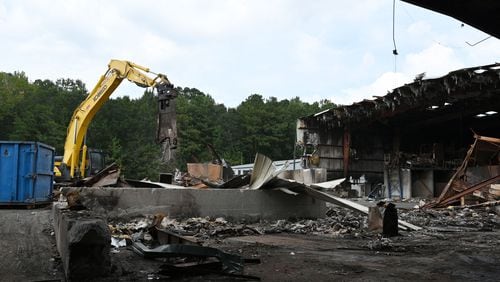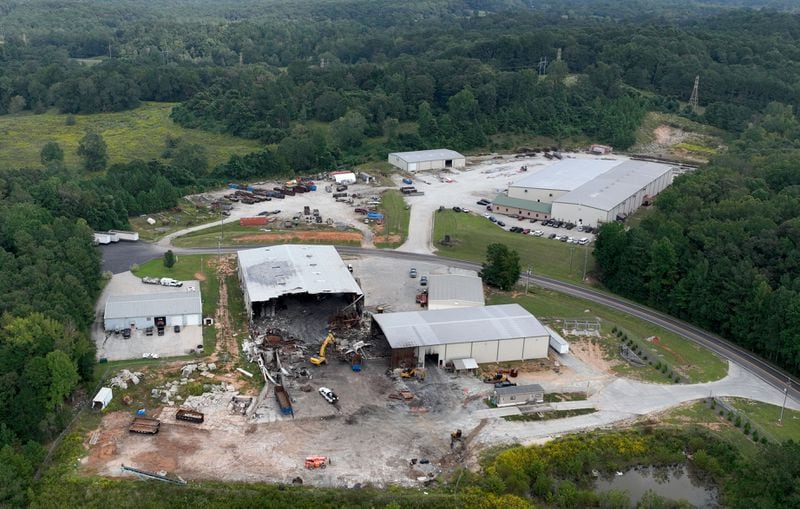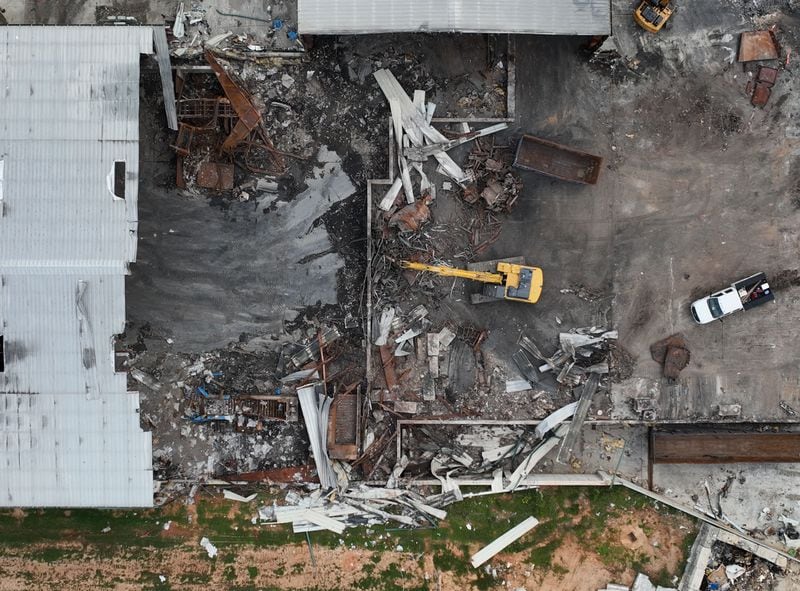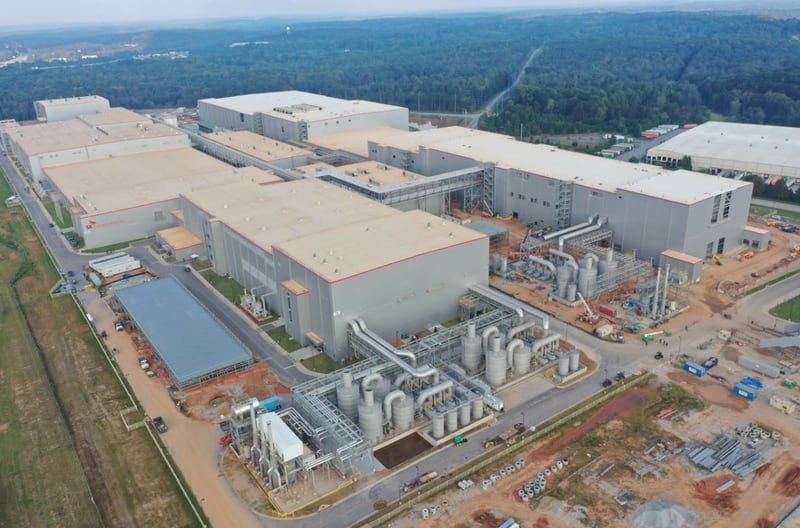A North Georgia battery factory has been fined by state authorities after discarded battery cells were improperly shipped to a recycling facility, sparking a fire last summer that burned the center to the ground.
Georgia’s Environmental Protection Division on April 17 published a negotiated consent order with SK Battery America Inc. that fined the company $33,000 after lithium-ion battery scraps were found within the scorched shell of the Metro Site recycling center in Commerce. The charred facility, which was not permitted to handle batteries among its recyclables and didn’t know it had received the components, is a few miles northeast from SK Battery’s $2.6 billion factory.
Georgia has become a national hub for electric vehicle and battery manufacturing, drawing tens of billions of dollars in investments and promises of tens of thousands of jobs. But the July 2023 fire highlights the serious — albeit rare — risk of mishandling battery technology that has become a cornerstone of modern life, powering a litany of products from smartphones to EVs.
Since 2020, Banks County Fire Chief Steve Nichols said his firefighters assisted with four blazes caused by battery scraps at Metro Site, which sits just across the Jackson County line and about 70 miles northeast of downtown Atlanta. It took firefighters four days and 3 million gallons of water to extinguish the inferno last summer.
“Each time, (Metro Site’s owner) kept getting assured (by SK Battery) that it won’t happen again,” Nichols told The Atlanta Journal-Constitution in late 2023. “But this time, it was devastating.”
Credit: HYOSUB SHIN / AJC
Credit: HYOSUB SHIN / AJC
In addition to prompting a state investigation, the fire sparked legal action by Scott Ledford, Metro Site’s owner. SK Battery declined to comment on the pending litigation, which seeks nearly $27 million in damages.
“SK Battery America has procedures in place to comply with guidelines on the shipping and disposal of hazardous material,” the company said in a statement emailed to the AJC.
SK Battery, a subsidiary of Korean conglomerate SK Group, was one of Georgia’s first forays into the EV and battery industries. State and local leaders offered the company nine-figure incentive packages for both the Commerce facility and a forthcoming joint battery factory between another SK business, SK On, and Hyundai Motor Group in Bartow County.
Ledford’s attorney, Gus McDonald, said SK Battery has amassed a track record of negligence, including multiple safety violations and fines levied by the U.S. Department of Labor’s Occupational Safety and Health Administration. McDonald said the company needs more oversight.
“(SK Battery) knew this was illegal. It made a choice to ignore safety,” he said. “They had one job — put explosive batteries in the correct bin. How hard is that to do?”
Thermal runaway
Experts say that lithium-ion batteries are a relatively safe technology, but note that failures can cause fires that burn white hot and are challenging to extinguish.
When one battery cell overheats and combusts, it can cause a chain reaction called thermal runaway. The reaction produces hydrofluoric acid vapors, a colorless gas that can damage the eyes, nose and respiratory tract, according to the Centers for Disease Control and Prevention. Breathing in high levels of the gas can be fatal.
Credit: HYOSUB SHIN / AJC
Credit: HYOSUB SHIN / AJC
Some devices like laptops and electric toothbrushes only have a few battery cells, but larger products like plug-in cars can have thousands.
Experts say EVs are not inherently more fire-prone than their gas-powered cousins — in fact, early evidence suggests they are less likely to burst into flames. But removed from the controlled environment that exists under a car’s hood, the lithium-ion batteries that make them go can be a fire risk, especially if mishandled.
Worldwide, at least 4,600 fires and 350 explosions have been recorded involving lithium-ion batteries since the start of 2021, according to UL Solutions, a company that offers testing, inspection and certification services. In the U.S. alone, more than 500 injuries and at least 80 fatalities have occurred over the same time period from incidents involving lithium-ion batteries, according to the data.
Any industrial fire, including ones involving lithium-ion batteries, can be dangerous to nearby communities, said Ofodike Ezekoye, a professor at the University of Texas at Austin, who works with engineers, firefighters and the battery energy storage industry to research safety concerns faced by first-responders.
South of Atlanta in Henry County, local leaders adopted an ordinance last year to classify lithium-ion batteries as a hazard and implemented regulations on their storage. Michael Black, the county’s fire marshal and assistant fire chief, said his department has yet to encounter an EV fire, but has battled battery fires from drones, cellphones and e-scooters.
“There’s not enough code on the fire safety side in place currently to handle any incidents that are caused by these batteries,” Black said.
A charged legal case
Only a few recycling centers are capable and permitted to handle lithium-ion batteries, but reuse of battery components is a critical part of the country’s fast-growing energy storage supply chain.
Credit: SK Battery America
Credit: SK Battery America
SK Battery has two contracted battery recycling partners, including Ascend Elements in Covington. Opened last year, Ascend breaks down and shreds packaged electric battery cells, which are often called jelly rolls, into a powder called “black mass” that is then converted into new lithium-ion battery components known as cathodes.
Metro Site crushes concrete and other building materials for reuse, but it isn’t a battery recycler. Pressure from such compaction can cause battery cells to combust. Nichols, the Banks fire chief, said an excavator most likely crushed batteries its operator had no idea were there, attributing that as the source of the blaze.
The SK Battery plant has a cell discharge building for defective or damaged battery components, which are then submerged in a water-based solution for four days, slit open and packaged for shipping to a recycler, according to the EPD investigation. Each shipment is supposed to be documented, but investigators said SK Battery was unable to provide a record of the battery shipment to Metro Site that caused the July fire.
In court documents, SK Battery alleged the mistake was made by its shipping contractor, which is not a defendant in the suit. McDonald, the attorney for Metro Site, said the recent consent order is “at odds” with SK Battery’s arguments in court. He said the case is scheduled for trial in August.
— Staff writer Reed Williams contributed to this report.











